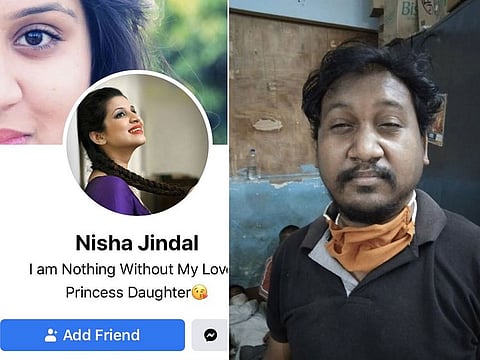‘I am Nisha Jindal, and I am in police custody': Indian man arrested for fake Facebook profile using a Pakistani model's photo
India: The man had been running multiple fake Facebook account since 2012

When police in the Indian state of Chhattisgarh went looking for 'Nisha Jandal', who was posting ‘inflammatory comments on her Facebook page', last week, little did they know that it was a 'he'. On April 18, Ravi Pujar, an Indian student was arrested in Raipur for running the fake Facebook profile that has 10,000 followers.
Police have found that he was using the identity of a Pakistani model including her personal information and photos for eight bogus accounts.
Ravi Pujar, who police say, has been failing his undergrad engineering exams for 11 years used to post communal messages under multiple fake IDs since 2012. He had allegedly been operating fake FB IDs in the name of ‘Nisha Jindal’ and Pakistani actress Miraha Pasha, say Indian media reports.
So, Nisha Jandal's 10,000 followers were shocked on April 18, when, police took his photograph in custody and made him post the truth on the Facebook account with the caption: "I am Nisha Jindal and I am in police custody". The post has gone viral.
Indian Administrative Service (IAS) officer Priyanka Shukla also tweeted in Hindi: “When the Raipur Police reached to arrest 'Nisha Jindal' for disrupting communal harmony, they found that Ravi, who has not been able to clear his engineering for the last 11 years, is the real Nisha."
The police got on his trail after getting complaints that someone was posting inflammatory, communal comments on Facebook. A cyber cell team was reportedly tasked with identifying and arresting the suspect. The cops traced his cyber footprints and zeroed in on Ravi. He was taken by surprise when a police team arrived to arrest him on Saturday. They seized a laptop and mobile phone.
According to local media reports, Raipur Senior Superintendent of Police (SSP) Arif H Sheikh has said that on social media, the accused posed as a member of organisations like the International Monetary Fund, the World Health Organisation and the World Trade Organization.
He has been booked under IPC 153A (promoting enmity between different groups) and 295A (deliberate and malicious acts, intended to outrage religious feelings) and section 67 of IT Act.
Sign up for the Daily Briefing
Get the latest news and updates straight to your inbox







